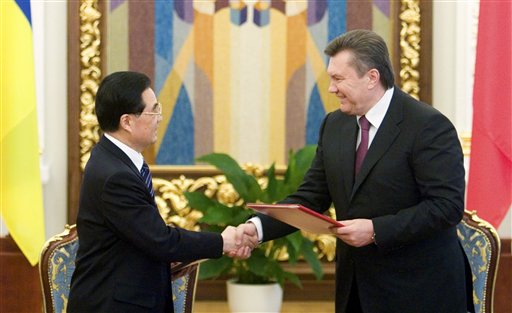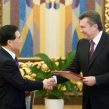
Kyiv Expects Chinese Investment Deluge After Hu Jintao’s Visit
Publication: Eurasia Daily Monitor Volume: 8 Issue: 120
By:

China’s President, Hu Jintao, signed important political and trade documents during his June 18 – 20 visit to Ukraine, winding up his CIS tour in which he also visited Kazakhstan and Russia. While Beijing is interested mainly in military-technical cooperation, Kyiv views China as primarily a source of investment for its weak economy. Although the practical meaning of the documents signed should not be underestimated, the symbolic benefits for Kyiv from establishing personal contacts with the leader of the world’s second largest economy may be even more important. This was the first visit to Ukraine by a Chinese leader in a decade. Prior to his arrival in Kyiv, Hu spent a day in Crimea with Ukrainian President Viktor Yanukovych, after which he called Ukraine “a close friend and important partner for China” (Interfax-Ukraine, June 20).
While Kyiv has been struggling for years to move closer to the European Union and fend off Moscow’s attempts to draw Ukraine back into its orbit, relations with China were largely neglected, reaching their nadir under the previous Ukrainian president, Viktor Yushchenko. However, Yanukovych after his election as president in February 2010 proclaimed China as one of his foreign policy priorities. He met with Hu Jintao twice before Hu’s visit to Ukraine, including his visit to China in September 2010. It should be relatively easy for pragmatic Yanukovych to conduct business with China as, unlike Brussels and Moscow, Beijing does not set uncomfortable political conditions for developing economic cooperation.
Yanukovych and Hu did sign a political document but it did not require sacrifices from Kyiv. The strategic partnership declaration signed in Kyiv on June 20 obliges the two sides to respect each other’s territorial integrity and sovereignty as well as the economic and political model of the partner state. China and Ukraine also pledged to develop close cooperation in the UN, and China promised not to use nuclear weapons against Ukraine as a non-nuclear state (UNIAN, June 20). The Ukrainian daily Segodnya, which is close to the ruling party, reported on June 21 that Kyiv hopes to develop an exclusive relationship with China through representing its interests in Europe once Ukraine signs a political association agreement with the EU, hopefully this year.
Yanukovych and the Ukrainian media stressed the importance of the economic accords reached with China. Yanukovych and Hu agreed that trade turnover between the two countries should reach $10 billion compared to $6 billion last year, when bilateral trade increased by 50 percent compared to 2009. Yanukovych said economic agreements worth $3.5 billion were signed with China, but he did not provide details. Yanukovych’s aide for national projects, Vladislav Kaskiv, specified that this figure was only a forecast for the end of 2011 while the single investment project thus far launched with China is the railroad link from Kyiv to the international airport of Boryspil, for which China’s Eximbank agreed to lend $372 million under Ukrainian government guarantees (Segodnya, June 21).
The documents signed in Kyiv also included a protocol on information exchange regarding exports and imports, an agreement on Chinese assistance in education to Ukraine worth $12 million and a memorandum between the two countries’ energy ministries which provides for joint oil and gas projects, information exchange on strategic energy facilities and cooperation in nuclear energy (www.zn.ua, June 20). Yanukovych invited Chinese investors in agricultural and infrastructural projects and offered Ukrainian participation in the construction of nuclear plants in China and in joint nuclear projects in third countries. He also offered Ukrainian pipes and compressors for the gas pipeline project which China and Russia are about to conclude (RIA Novosti, June 20). The Ukrainian Coal and Energy Ministry said in a press release that it agreed with the Chinese company Sinohydro to jointly build hydropower stations in Ukraine. Ukraine and China also signed a contract aimed to restore production at the Oriana potash fertilizer producer in Western Ukraine, which has been idle for almost a decade (Interfax-Ukraine, June 20).
No specific figures were provided on the investment projects let alone military-technical cooperation, which Yanukovych and Hu must have discussed behind closed doors. There was no press conference and the two leaders made only short statements to the press after their talks. Details of the military-technical agreements reached will emerge in the local press only later as it often occurs on such occasions. China is reportedly especially interested in Soviet-Ukrainian technologies to make engines for warships, in particular for aircraft carriers. Ukraine recently supplied engines for the first Chinese aircraft carrier to be launched this year. Ukraine sold its hull, which is the still-born Soviet aircraft-carrying cruiser Varyag, to China in 1998. China is also interested in Ukrainian Antonov aircraft, the R-27 air-to-air missiles and anti-tank missiles, the 6TD-2 tank diesel engines and the Zubr hovercraft (Zerkalo Nedeli, June 18; Kommersant-Ukraine, June 20).




